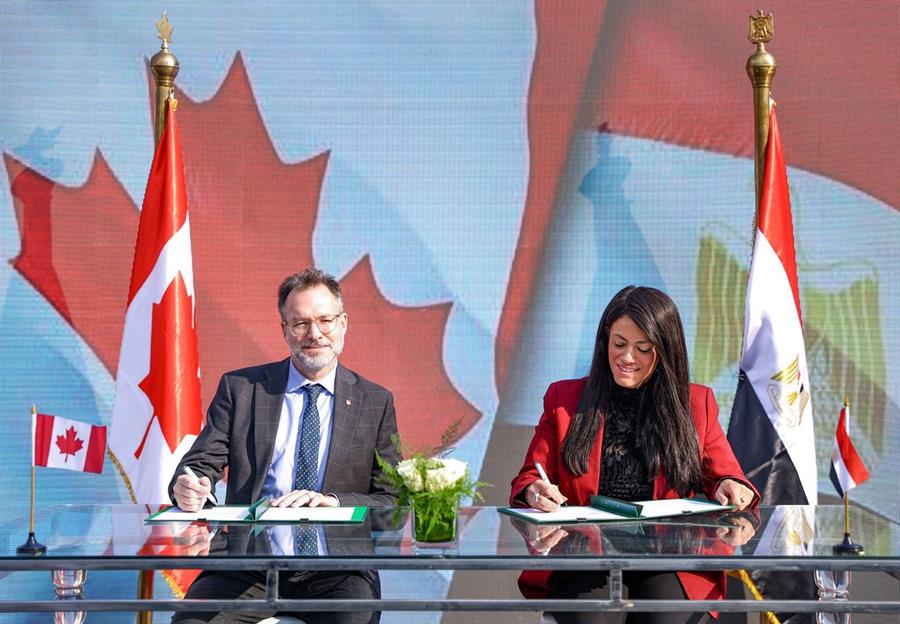Egypt’s NIGSD Executive Director participates in a workshop on accelerating the implementation of Agenda 2030 & Africa Agenda 2063

31 October 2021
Dr. Sherifa Sharif, Executive Director of the National Institute for Governance and Sustainable Development (NIGSD), participated in a session entitled “Accelerating Recovery from the effects of COVID-19” within a workshop on accelerating the implementation of Agenda 2030 and Africa Agenda 2063 entitled “Building Resilient Institutions to Achieving Sustainable Development Goals in a Time of COVID-19.”.
The workshop was organized by the African Peer Review Mechanism (APRM) and The Executive Committee on Economic and Social Affairs (ECESA).
During her speech, Dr. Sherifa Sherif reviewed the Egyptian rapid response program to the repercussions of the Coronavirus. Sherifa Sherif pointed out that COVID-19 is not just health, humanitarian or socio-economic crisis, but it is also a governance crisis that tests the resilience of government systems and institutions around the world.
She emphasized that the lack of an adequate accountability and oversight mechanism to respond to and recover from crises greatly increases the risks of corruption and that it is important to integrate transparency, accountability, and combating corruption into all response and recovery priorities.
Sherif emphasized that the COVID-19 crisis has a regional dimension as the pandemic has infected millions and caused the biggest economic downturn in nearly a century, which is having a clear impact on development gains as the world approaches 2030.
Dr. Sherifa Sharif explained that it is important to work to provide job opportunities to meet the challenges of this crisis; with a clear view of all stakeholders with each other, and putting global and continental conversations on the ground about accelerating implementation using the principles of the Committee of Experts on Public Administration (CEPA).
The Executive Director of the National Institute for Governance and Sustainable Development referred to the measures taken by the Egyptian government to confront the Covid-19 crisis, which was to adopt a proactive strategy at an early stage to take the necessary measures to mitigate the negative impact of the epidemic.
The strategy focused on achieving a balance between ensuring the safety of public health and the sustainability of the wheel of economic activity, and the government was keen to enhance confidence by developing an effective response strategy to restore recovery.Dr. Sharifa Sharif said that this strategy was based on ten main principles, including that the citizen is a central and comprehensive pillar, reliance on evidence-based transparency, the continuation of the education process through distance education, regional and global solidarity, the balance between recovery and achieving the goals of the 2030 Agenda, and the balance between health public and economic activity. These principles also include institutions and a mechanism for assisting groups affected by the epidemic, effective collective communication with the public, in addition to a proactive and continuous response, and giving priority to the sectors most affected.Concerning, innovative solutions and procedures to face the repercussions of the epidemic; Dr. Sherifa Sharif explained that it is represented in easing the burden in the most affected sectors, including reducing the interest rate, postponing the maturity of credit and taxes, paying loans and fees, in addition to supporting irregular employment through stimulus packages, disbursing cash grants and creating a database for more than 6 million workers.
Sherif added that among those solutions is the implementation of a vaccine strategy aimed at vaccinating the largest possible number of Egyptians in an attempt to reach 20 million Egyptians, as well as an education strategy to contain the spread and continue the school year as usual for different educational levels through distance education.
Sherif indicated that the Ministry of Planning and Economic Development established an observatory or tracker of covid 19 policies, which includes all government efforts in recovering from Covid-19 through monitoring the assessment and response to the needs of citizens.
The workshop aims to accelerate the implementation of the 2030 Agenda for Sustainable Development and Africa's Agenda 2063 and focus on follow-up and review processes at the national and regional levels.
The workshop also aims to strengthen governance to achieve the sustainable development goals, including the implementation of the principles of the Committee of Experts on Public Administration (CEPA), among African countries in partnership with the African Peer Review Mechanism (APRM), and to enable countries to transfer lessons learned from voluntary national reports ( VNRs and other review processes lead to effective and actionable solutions, especially by integrating Agenda 2030 and Agenda 2063 into sustainable development strategies and plans).









